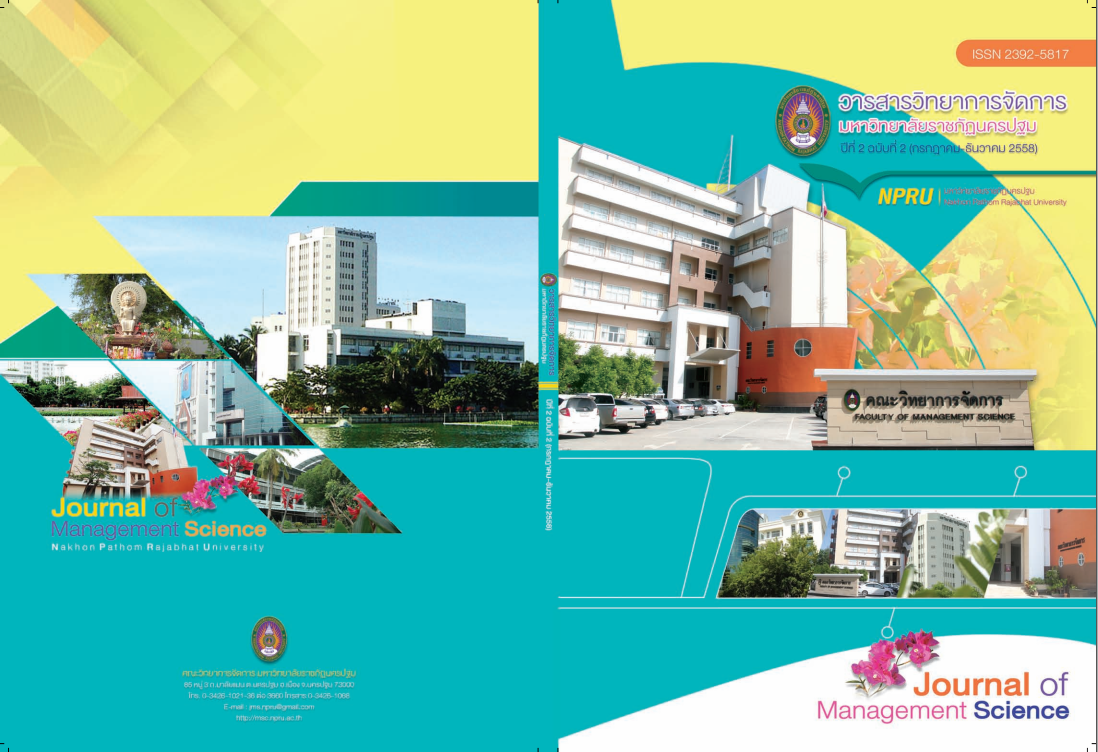Factors affecting work happiness of Silpakorn University’s supporting staff
Main Article Content
Abstract
The purposes of this research were to: 1) study the levels of factors on staff performance and the levels of work happiness of Silpakorn University’s supporting staff; 2) compare the levels of work happiness of Silpakorn University’s supporting staff, classified by the individual factors; 3) study the factors on staff performance affecting work happiness of Silpakorn University’s supporting staff; and 4) study the guidelines promoting work happiness of Silpakorn University’s supporting staff. The sample group consisted of 9 administrators and 210 supporting staffs. The research instruments used for collecting data were the questionnaire and the in-depth interview constructed by the researcher. The statistics employed
for data analysis comprised frequency, percentage, arithmetic mean and standard deviation (S.D.), Independent samples T-test, One-Way ANOVA, correlation coefficient, stepwise multiple regression analysis and content analysis.
Research findings are concluded as follows: 1) The overall levels of factors on staff performance and work happiness of Silpakorn University’s supporting staff were at a high level. 2) Silpakorn University’s supporting staff with different work experiences had statistically significant difference in work happiness in overall at a level of .05. The personal factors which are the differences in sexes, ages, educational levels, marital status, average monthly income, affiliated sections and working branches did not affect work happiness of Silpakorn University’s supporting staff. 3) Factors on staff performance were correlated positively with the work happiness of Silpakorn University’s supporting staff at a significant level of .01. 4) The factors that related to work happiness of Silpakorn University’s supporting staff and could be used to establish prediction equations of work happiness for Silpakorn University’s academic supporting staff were
organizational supports and exertion–with predication ability accounting for 48.3%. 5) the guidelines promoting work happiness of Silpakorn University’s academic supporting staff can be considered from the following aspects: 1) promoting good organizational climate, 3) implanting academic supporting staff with public-mindedness, 4) implementing the principle of Good Governance, 5) caring for family of academic supporting staff, 6) promoting the cooperation and unity in critical circumstances, 7) supporting the supporting staffs attending in the academic field conference or related academic field trainings, workshops
and seminars as well as establishing their high cooperation in joining tour visits by providing opportunities for career progression and distributing scholarship for academic supporting staff, 8) applying King Bhumibol Adulyadej's "Sufficiency Economy" philosophy, 9) conveying academic supporting staffs’ willingness to
devote for the benefit of organization, 10) encouraging academic supporting staff to develop organizational commitment and loyalty, 11) creating an atmosphere of constructive work with the sacrifice to achieve organizational goals, and 12) understanding the concept of organizational change management.
Article history : Accepted 4 August 2015
SIMILARITY INDEX = 1.12
Article Details
The views and opinions of the article appearing in this journal are those of the author. It is not considered a view and responsibility of the editorial staff.
References
แผนงานสุขภาวะองค์การภาคเอกชน. (2552). มาสร้างองค์การแห่งความสุขกันเถอะ. กรุงเทพฯ : สำนักงานกองทุนสนับสนุนการสร้างเสริมสุขภาพ.
มหาวทยาลัยศิลปากร, กองแผนงาน. (2556). รายงานประจำป 2556. นครปฐม : มหาวิทยาลัยศิลปากร.
วิสุทธิ์ จิราธิยุต. (2552, พฤศจิกายน 19). มาตรฐาน MS-QWL สร้างองค์การอยู่ดีมีสุข. ประชาชาติธุรกิจ, 30.
อภิชาติ ภู่พานิช. (2551). การใช้ดัชนีวัดระดับความสุขในการทำงานของบุคลากรสังกัดสำนักงานอธิการบดี มหาวิทยาลัยธรรมศาสตร์. วิทยานิพนธ์ปริญญาสังคมสงเคราะห์ศาสตร์มหาบัณฑิต. สาขาวิชาสังคมสงเคราะห์ศาสตร์บัณฑิตวิทยาลัย. มหาวิทยาลัยธรรมศาสตร์.
Best, J.W. & Kahn, J.V. (1998). Research in Education (8th ed.). Boston : Allyn & Bacon.
Diener, E. (2003). Subjective well-being. Psychological Bulletin, 95 (3X,542-575)
Cronbach, L.J. (1990). Essentials of psychological testing (5th ed.). New York : Harper & Row.
Good, M. L. (2006). Integrating the individual and the organization. New York : Wiley.
iOpener. (2014). The science of happiness at work. Accessed 9 July 2015. Available from https://www.iopener.com/the-science-of-happiness.
Krejcie, R. V. & Morgan, D. W. (1970). Determining sample size for research activities. Education and psychological measurement, 30 (3), 607- 610.
Schermerhon, J. R., Hunt, J. G., & Osborn, R. (2003). Organizational behavior management (8th ed.). New York : Wiley and Sons.
Warr, P. (1990). The measurement of well-being and other aspects of mental health. Journal of occupation psychology, 63, 193- 210.


